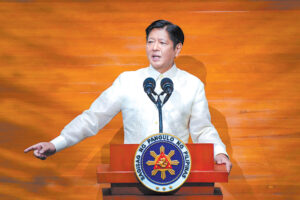By Chloe Mari A. Hufana, Reporter
PHILIPPINE PRESIDENT Ferdinand R. Marcos, Jr.’s post-midterm legislative agenda signals a shift from political maneuvering to institutional consolidation, but analysts warned that his cautious, technocratic approach risks entrenching the same structural weaknesses that have long held back the Philippine economy.
“Post-midterms, the Marcos administration has entered a phase less about electoral maneuvering and more about institutional consolidation,” Ederson DT. Tapia, a political science professor at the University of Makati, said in a Facebook Messenger chat.
“The agenda shows a preference for amending and modernizing existing laws rather than wholesale disruption, a cautious but steady approach… Marcos is stabilizing the system while signaling that governance is as much about endurance as it is about reform,” he added.
He noted that Mr. Marcos is pairing fiscal discipline with socially resonant programs such as village empowerment and scholarships to reinforce political stability while advancing selective reforms.
The President and congressional leaders have identified 44 priority bills under the common legislative agenda for the 20th Congress, with a focus on fiscal reform, transparency and governance modernization.
As he entered the second half of his six-year presidency, his administration’s flagship proposals were a general tax amnesty, amendments to the Bank Deposits Secrecy law and revisions to the Anti-Money Laundering Act (AMLA) — measures the administration said would strengthen financial integrity, expand revenue collection and align the Philippines with global standards.
Mr. Tapia added that the government’s focus on transparency, through long-delayed measures such as the Freedom of Information bill, bank secrecy waivers, and AMLA compliance, reflects an effort to bolster credibility both at home and abroad.
“Yet these are carefully offset by populist and constituency-friendly laws,” he said. “Marcos is not positioning himself as a reformist disruptor, but as a manager of equilibrium, marrying modernization with political pragmatism.”
He said such technocratic balancing could prove unsustainable without structural change.
Corruption issues are at the forefront of Mr. Marcos’ remaining three years in office following his State of the Nation Address in July where he called out government officials engaged in public works corruption.
Since then, various branches of the government have conducted several probes in the hopes of holding erring officials accountable.
Jose Enrique A. Africa, executive director of research group IBON Foundation, said the administration’s legislative priorities are “deeply inadequate” to address the economy’s structural weaknesses.
“The underlying limitation is that the agenda isn’t defined by a coherent development framework to transform the Philippine economy away from overdependence on low-productivity services, foreign capital and imports,” he said via Viber.
Mr. Africa said even the seemingly progressive measures — tax amnesties, infrastructure masterplans and agricultural support — fail to address the root causes of inequality.
“Corruption is so bad and enforcement so weak that amnesties just worsen noncompliance. The biggest beneficiaries are the wealthy and powerful.”
He added that agriculture, despite its importance, continues to receive “token” funding of barely 4% of the national budget.
He warned that the government’s investment policies remain tilted toward attracting foreign capital rather than strengthening domestic industries.
“Without strategic reviews of foreign investments, the Philippines risks deepening corporate control over public services,” he said.
A more effective strategy, according to the economist, would be to require reviews of foreign investments to assess their impact on national industrialization and security and to ensure investment deals prioritize technology transfer, local linkages and broader contributions to the Philippines’ industrial growth.
John Paolo R. Rivera, a senior research fellow at the Philippine Institute for Development Studies, said the government’s approach reflects an attempt to reconcile short-term fiscal goals with longer-term institutional reform.
“Measures like a general tax amnesty aim to boost revenue in the short term, while easing bank secrecy and updating the AMLA… reflect a push to improve transparency, accountability, and compliance with global standards,” he said via Viber.
“Together, they show a strategy focused not just on growth but on rebuilding trust and governance integrity as pillars for sustainable development,” he added.
The 44-item legislative package seeks to improve the investment climate, expand social services and bolster agricultural and energy security.
Key transparency-related bills were also included, specifically the long-delayed Freedom of Information measure, a proposal requiring civil servants to waive bank secrecy, and a Progressive Budgeting bill aimed at enhancing accountability in public spending.
The common legislative agenda also outlined digital-era legislation, including the Cybersecurity Act, Digital Payments Act, regulations on online gambling and rules governing the use of artificial intelligence in elections, underscoring the administration’s push to modernize the country’s regulatory framework.
The full list also covers proposed changes to agrarian reform and social service laws, infrastructure planning and the Local Government Code.
